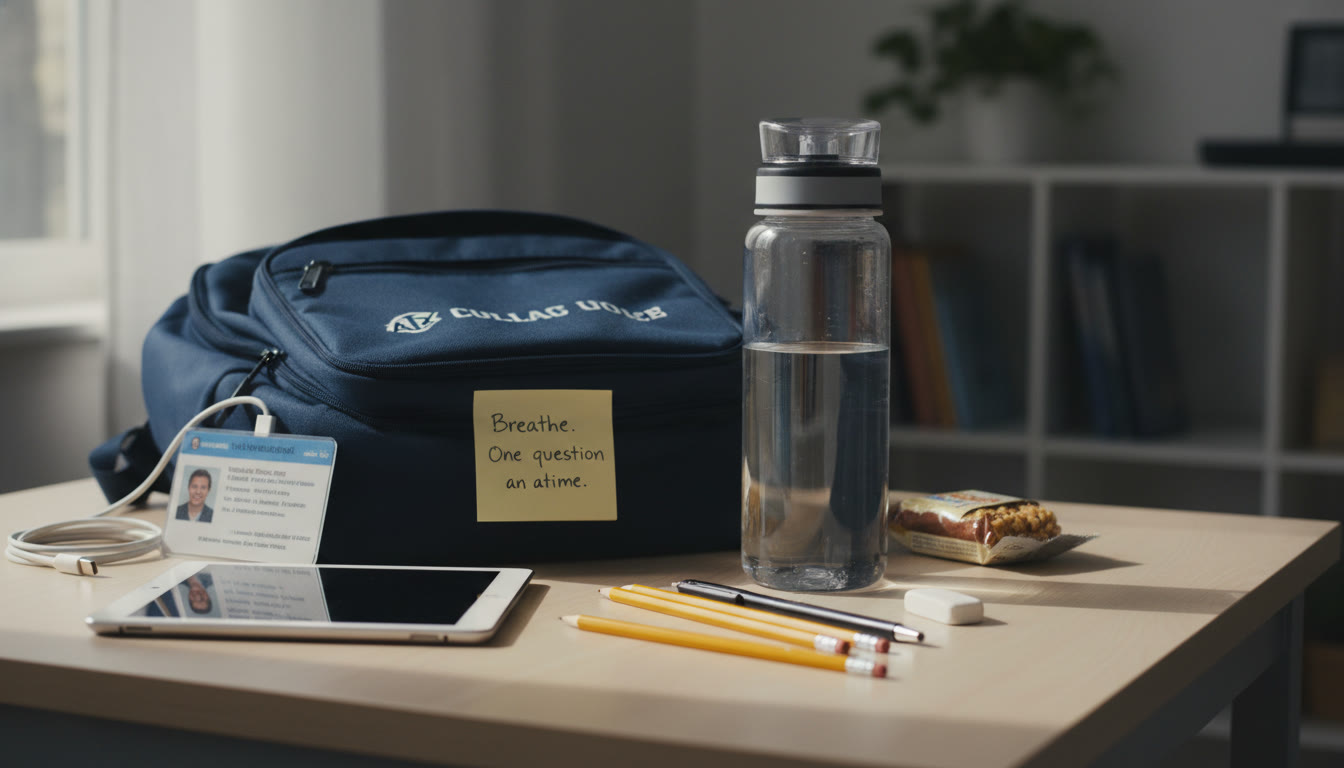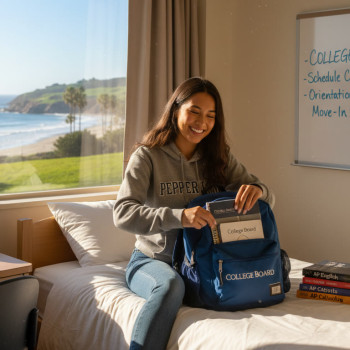Why Self-Compassion Matters for High Achievers
If you’re reading this between a stack of flashcards and a half-drunk coffee, you already know the drill: AP classes demand high-level thinking, intense focus, and consistent effort. For many students, that pressure becomes a constant inner critic that whispers—sometimes screams—“not enough.” But here’s the thing: relentless self-criticism doesn’t sharpen performance; it exhausts it. Practicing self-compassion is not about lowering standards. It’s about treating yourself with the same care you’d offer a close friend so you can think more clearly, learn more deeply, and show up calmer on test day.

What Self-Compassion Really Is
Psychologists define self-compassion as three core components: self-kindness (vs. self-judgment), common humanity (recognizing that struggle is part of human experience), and mindful awareness (observing emotions without getting swept away). For AP students, these translate into small but powerful shifts: replacing “I failed this practice exam, I’m a failure” with “This practice exam shows what to work on next”—and then making a plan.
The Cost of Perfectionism—and Why It Backfires
Perfectionism can masquerade as motivation, but it often leads to procrastination, anxiety, and burnout. When the bar is set as ‘perfect’ instead of ‘progress,’ students may avoid attempting difficult problems for fear of imperfection. This leads to less practice, not more—exactly the opposite of what you want for AP mastery.
- Perfectionism narrows focus to outcomes (a score) rather than process (skills).
- Chronic self-criticism raises stress hormones that impair memory and reasoning.
- Self-criticism reduces resilience—setback becomes identity rather than data.
Reframing Mistakes as Data
Try this experiment: after a practice A P exam or timed section, write three specific mistakes you made and next to each, one targeted action. Treat the mistake like a data point in a lab notebook. That shift—from moral judgment to diagnostic curiosity—lowers shame and improves learning efficiency.
Practical Self-Compassion Habits for AP Students
Self-compassion is a practice, not a once-and-done mantra. Below are concrete routines you can adopt. Start with one small habit and build from there.
Daily Micro-Rituals (5–20 minutes)
- Morning Check-In (2–5 minutes): Ask, “What’s one realistic goal today?” Keep it tiny—finish one practice set or revise one essay outline.
- Midday Pause (3–7 minutes): Step away from screens. Breathe for four counts in, four out. Name one feeling without judgment: “I notice frustration.”
- Evening Reflection (5–10 minutes): Note three wins—no matter how small—and one thing to improve tomorrow. This fosters a growth-focused mindset.
Study Strategies That Respect Your Limits
Study smarter, not longer. Use techniques that preserve cognitive energy and reduce burnout.
- Distributed Practice: Short, frequent sessions beat one marathon. Two 45-minute sessions on different days beat a single 4-hour cram.
- Interleaving: Mix problem types instead of repeating the same kind; it strengthens retrieval and adaptability.
- Active Recall and Teaching: After studying a concept, explain it out loud as if teaching someone—this reveals gaps without judgment.
- Rest as Strategy: Schedule breaks and treat them as essential study time. Your brain consolidates learning during rest.
How to Respond to Setbacks with Kindness
Setbacks—lower-than-expected scores, tough free-response prompts, or a schedule that collapsed—are inevitable. The way you respond is what matters.
A Simple Three-Step Reset
- Pause: Allow disappointment for thirty seconds. Name it: “I’m disappointed and anxious.”
- Practice Self-Kindness: Replace harsh language with a kinder phrase: “I’m disappointed, but I’m capable of improving.”
- Plan One Next Step: Choose a single, concrete action (e.g., review the three most missed topics under timed conditions tomorrow).
Sample Weekly Routine for Balance
Below is a template that mixes study, rest, and self-compassion moments. Tailor it to your AP load; the point is consistent, sustainable rhythms—not rigidity.
| Day | Focused Study Blocks | Compassion Check | Active Recovery |
|---|---|---|---|
| Monday | 2 × 50 minutes (AP Calculus practice + FrQ review) | Evening reflection: 3 wins | 20-minute walk |
| Tuesday | 1 × 60 minutes (AP Biology concept mapping) | Midday pause: breathing | 30 minutes reading for pleasure |
| Wednesday | 2 × 45 minutes (AP US History timelines + practice questions) | Check-in: set one realistic goal | Social time with friends or family |
| Thursday | 1 × 50 minutes (AP Chemistry problem set) | Affirmation: “I can improve with effort” | 10-minute guided relaxation |
| Friday | Mixed review 90 minutes (short, timed practice) | Write one learning insight | Movie night or hobby |
| Saturday | Mock exam or timed practice (3–4 hours broken into parts) | Post-practice reset: one kind plan | Long outdoor activity |
| Sunday | Light review 45 minutes | Plan week, include rewards | Meal prep and rest |
How Social Support and Tutoring Fit In
No one is meant to do this alone. Study groups, teachers, and tutors can reduce isolation and provide targeted feedback. Personal help matters because it turns vague anxiety into clear action steps. For students who want structured support, personalized tutoring—like Sparkl’s 1-on-1 guidance—can create tailored study plans, identify the highest-impact weaknesses, and provide accountability so your practice sessions are kinder and more effective. When a tutor explains a concept with warmth and clarity, it’s not just content you gain—it’s confidence.
When to Ask for Help
- If mistakes pile up in one topic despite practice, get targeted help.
- If anxiety disrupts sleep or concentration for more than two weeks, talk to a counselor or a trusted adult.
- If you feel trapped in a loop of perfectionism and procrastination, a tutor or coach can break the cycle with structure and empathy.
Mindful Techniques That Actually Work
Mindfulness doesn’t have to be abstract. Here are short, evidence-informed practices you can weave into your study routine.
- Box Breathing: 4-4-4-4 counts to stabilize heart rate before a timed section.
- Two-Minute Reset: Close your eyes, label three sensations (e.g., “tight shoulders, shallow breath, buzzing thoughts”), and take three deep breaths.
- Re-Scripting Thoughts: If your inner voice says “I’m so dumb,” add the qualifier: “I’m struggling with this problem right now, and that’s okay.”
Examples: How Self-Compassion Transformed Study Days
Stories help illustrate. Below are two composite examples that capture common patterns.
Case 1: The Perfectionist Who Wouldn’t Try
Sam avoided timed practice because the first scores were low. After a week of micro-goals—commit to only one timed 30-minute section and record one insight—Sam realized progress happens in increments. Gradually, timed practice became less threatening; scores improved because Sam practiced more, not because he punished himself for being imperfect.
Case 2: The Overbooked Multitasker
Jaya was taking three APs and working part-time. Exhaustion made studying inefficient. She introduced two changes: a strict 90-minute nightly wind-down and replacing “I should study more” with “What’s one meaningful study action today?” That small permission to rest led to clearer focus during study blocks and better retention.
Measuring Progress Without Being Cruel
Resist using only raw scores as validators of worth. Instead, track process metrics:
- Number of focused study blocks completed this week.
- Types of problems attempted (are you avoiding certain topics?).
- Quality of reflection—did you note one action after a practice test?
These indicators are within your control and fuel sustained improvement, while a single exam score can swing for many reasons (sleep, timing, question selection).
Preparing for Exam Day with Compassion
The night before an AP exam is prime time for worry. Build a calm ritual: finalize logistics (ID, testing app if digital, snacks), complete one light review (not new material), and do a 10-minute wind-down. On exam day, before the first page, take a 30-second breathing break and remind yourself: you prepared; you will do your best; your worth is not defined by one score.

When to Seek Professional Help
Self-compassion practices are powerful, but they aren’t a replacement for professional care. If anxiety or depressive symptoms persist—interfering with sleep, appetite, relationships, or school functioning—reach out to your school counselor, a mental health professional, or a trusted adult. Asking for help is a brave, compassionate act toward yourself.
Putting It All Together: A One-Week Starter Plan
Try this gentle starter plan designed to build momentum without crushing you.
- Day 1: Set one small study goal and a reward (e.g., finish 30 AP Chemistry practice questions; reward: 30 minutes of your favorite show).
- Day 2: Add a two-minute mindfulness break after each study block.
- Day 3: After practice, write one mistake and one specific fix.
- Day 4: Schedule a social break—call or hang out with someone who lifts you up.
- Day 5: Take a practice section and follow it with a planned restoration activity.
- Day 6: Reflect on wins and plan the next week’s micro-goals.
- Day 7: A light review and a full rest block—no studying after dinner.
Final Words: Excellence Rooted in Kindness
Being a high achiever doesn’t mean being harsh to yourself. True excellence thrives when curiosity replaces fear, rest is seen as fuel, and setbacks are treated as information. Self-compassion is not an indulgence—it’s a performance strategy. It makes your study time more efficient, your practice more sustainable, and your relationship with learning healthier.
If personalized support would help, consider options that combine expertise with empathy. Tutors who build tailored study plans and provide patient, targeted guidance—along with AI-driven insights that highlight the highest-impact areas to focus on—can make the path to your goals smoother and kinder. A compassionate coach doesn’t just teach content; they teach you how to learn without losing yourself in the process.
You’re doing important work. Treat yourself with the care you’d offer someone you believe in—because you deserve that same belief.
Ready to take the next step? Start with one small act of self-kindness today: a five-minute break, one tiny goal, one gentle observation—and notice how your study life begins to change.
















No Comments
Leave a comment Cancel